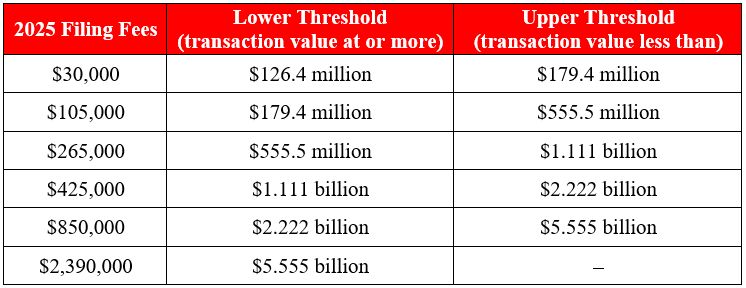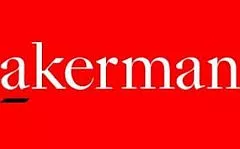Key Takeaways
- The 2025 adjusted HSR threshold is $126.4 million. All transactions valued below that amount are exempt from the HSR filing requirement.
- The 2025 adjusted Size of Party thresholds for transactions valued below $478 million are $25.3 million and $252.9 million.
- The HSR filing fee schedule was also updated, but the lowest fee remains $30,000.
Summary
The Federal Trade Commission (FTC) has announced its annual adjustment to the thresholds for pre-merger notification filings under the Hart‐Scott‐Rodino Antitrust Improvements Act of 1976 (HSR). The adjustments account for changes in the U.S. gross national product. The FTC also announced increases in the HSR filing fee schedule, thresholds for interlocking directorates under Section 8 of the Clayton Act, and an increase to the maximum civil monetary penalties for violations of 16 statutory provisions that the FTC enforces.
The new thresholds go into
effect for transactions closing
on or after February 21, 2025.
HSR Act Thresholds
The HSR Act requires entities contemplating mergers or acquisitions of voting securities, non-corporate interests, or assets that meet or exceed certain monetary thresholds to file pre-merger notification forms with the FTC and the U.S. Department of Justice (DOJ) and to wait a designated period of time (typically 30 days) before consummating the contemplated transaction. The key thresholds are summarized below:

HSR Filing Fees
The FTC also revised the HSR filing fee schedule based on changes to the U.S. gross national product and the consumer price index. The 2025 filing fee schedule is as follows:

The regulations governing the methodology for calculating the size of party and the size of transaction tests, as well as exemptions from the HSR Act, remain unchanged.
Interlocking Directorates Safe Harbor
In addition, the FTC revised the thresholds for Section 8, which prohibits a person from serving as a director or officer of two competing corporations (known as an interlocking directorate or an interlock). The prohibition is now triggered if each corporation has capital, surplus, and undivided profits aggregating more than $51,380,000 and each corporation's competitive sales are at least $5,138,000, unless an exception applies.
Maximum Civil Penalties
Finally, the FTC announced adjustments to various maximum civil penalty levels for certain laws it enforces, including failure to file an HSR notification. Of most interest, the maximum civil monetary penalty for violations of the HSR Act and Section 5 of the FTC Act (concerning unfair methods of competition and unfair or deceptive acts or practices) increased to $53,088 per day. The maximum penalty levels apply to civil penalties assessed after they went into effect, including civil penalties imposed for violations that predated the increased penalty levels.
The content of this article is intended to provide a general guide to the subject matter. Specialist advice should be sought about your specific circumstances.


